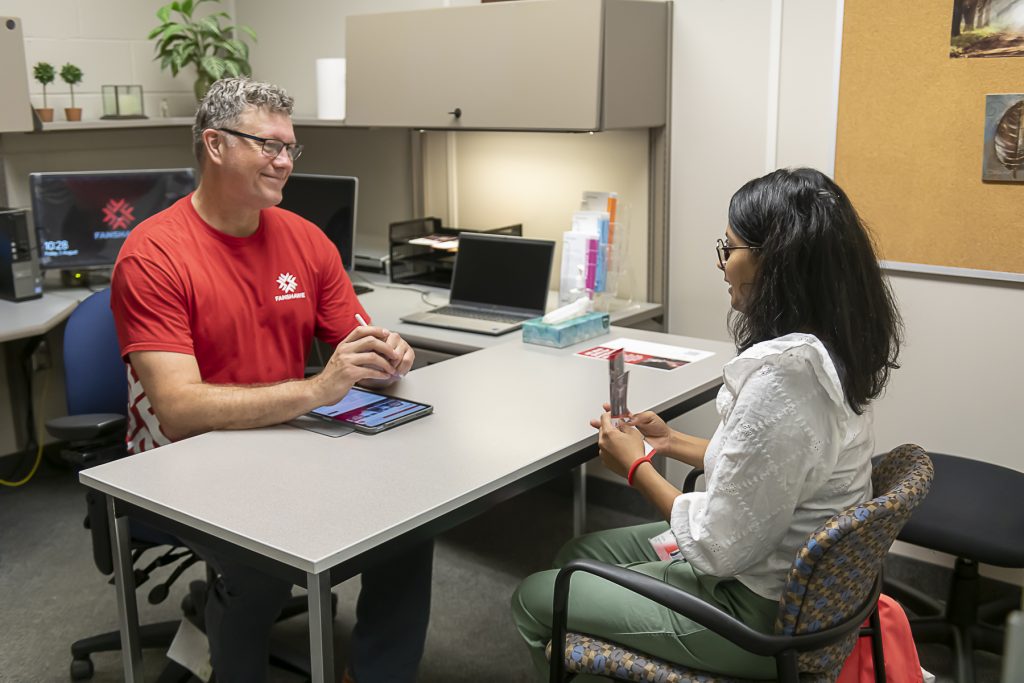Chapter 5: PLAR FAQ’s
5.0 PLAR FAQ’s

PLAR FAQs
Click on each of the following questions to learn more about PLAR at Fanshawe.
1. What is the institutional policy guiding PLAR at Fanshawe?
PLAR processes and practices at Fanshawe are guided by Policy A124, Recognition of Prior Learning: https://www.fanshawec.ca/sites/default/files/legacy/oldfanshawe/sites/default/files/assets/policies/pdf/a124.pdf
The College’s PLAR process is designed to accurately, fairly and equitably assess your experiences to determine if such learning minimally meets college-level learning standards. Assessors balance the need to protect College credentials and community interests against the need to fairly recognize prior learning as college-level.
2. Are all courses at Fanshawe eligible for PLAR?
Fanshawe strives to make PLAR available for as many credit courses as possible in programs eligible for funding. Due to restrictions from particular regulatory bodies, or the nature of the course, some courses are not PLAR eligible. If a course is not eligible for PLAR, the reasons and considerations will be documented in the Course Outline.
3. What is a Course Outline?
A course outline is a summary document of essential information for each Fanshawe course, which includes learning outcomes and evaluations in a standardized format. They are a primary resource for students to identify key information for their courses.
As a PLAR candidate, you can use course outlines to review the learning outcomes of the course(s) you are considering challenging by PLAR and to self-assess your learning against those learning outcomes before filing a PLAR application.
Course outlines for Fanshawe courses are publicly available. You can request course outlines at our Pathways and Transfer Credit webpage.
4. What is residency requirement?
Residency is the minimum percentage of courses in a college program you need to complete in the program at Fanshawe to be eligible to graduate with the program’s credential. According to Fanshawe College policy A122 [A122 Graduation from Approved College Programs (fanshawec.ca)] to be eligible for any College credential you must be enrolled and complete at least 25% of that program’s credit units at Fanshawe College. This means the number of credits you can attain through PLAR and/or credit transfer cannot be more than 75% of that college program. Degree programs must follow the Postsecondary Education Quality Assessment Board (PEQAB) [Postsecondary Education Quality Assessment Board (peqab.ca)] guidelines.
5. What are PLAR Learner Guides and how do I find them?
A PLAR Learner Guide is a resource for candidates and students to help them decide whether they should move forward with a PLAR application. Learner Guides are developed for specific courses and contain general PLAR information, as well as detailed course information relevant for applicants wishing to PLAR the specific course.
Not all courses eligible for PLAR will have a PLAR Learner Guide.
Book an appointment with an Admissions and Pathways Advisor or contact your Program Coordinator to inquire about PLAR eligibility and see if a PLAR Learner Guide is available for the course you wish to PLAR.
6. Can I use my prior learning to PLAR the admission requirements of a Fanshawe program?
At Fanshawe, PLAR is used to assess your informal and non-formal learning for the purpose of granting academic credit. If you are successful at challenging one or more courses in a program through PLAR, you must still meet the admission requirements of the College program to register in that program.
7. How does PLAR impact my OSAP eligibility?
If you receive OSAP funding and your course load drops below that of a full-time student because of credits earned through PLAR, eligibility for financial assistance through the Ontario Student Assistance Plan (OSAP) may be impacted. For questions about OSAP eligibility, contact Financial Aid and Student Awards.
8. I failed my PLAR attempt, what are my options?
At Fanshawe, PLAR may be available to applicants and students who have been unsuccessful passing a course or challenging it through PLAR. Please note that you will need to demonstrate sufficient evidence of new learning and attain written approval from your Associate Dean or delegate in order to proceed with another PLAR assessment.
Fanshawe students may also appeal PLAR assessment decisions in accordance with policy A128: Student Appeals. Applicants who wish to challenge a PLAR assessment decision should contact the Academic School.
9. My program is in a regulated profession, can I still apply for PLAR?
Some regulatory bodies limit the applications of PLAR in regulated programs. If your program is in a regulated profession, please inquire directly with the regulatory body regarding possibilities and recognition of the PLAR process. You can also contact your Program Coordinator.
10. Can I PLAR a portion of a course if I meet some of the learning outcomes, but not all?
At Fanshawe, PLAR cannot be used to challenge a portion of a course. The PLAR process at Fanshawe is tightly connected to the course learning outcomes of a specific course or set of courses. To be eligible for PLAR credit, your learning needs to match at least 75% of the learning outcomes of a college course. If your learning aligns with some, but not all, of the learning outcomes of a course, you may not be eligible for course credit.

